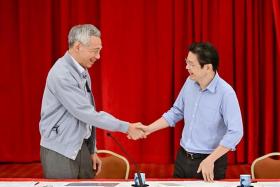Proposed law covers only those who spread fake news deliberately
Those who spread fake news without knowing the truth will not face penalties
Only those who deliberately fabricate news and spread falsehoods are liable to face criminal charges under the proposed law against fake news, Law and Home Affairs Minister K. Shanmugam told The Straits Times yesterday.
Those who spread fake news without knowing the truth have nothing to fear. Similarly, a person who starts something based on a misunderstanding will not face penalties, he added.
"There might be one person who deliberately puts the falsehood out, and then there might be thousands who spread it," said Mr Shanmugam, in spelling out what behaviour would be targeted by the Protection from Online Falsehoods and Manipulation Act, and how malicious intent would be determined by the police and prosecution.
"The Bill doesn't seek to impose criminal penalties on the thousands who spread the original post, as many people do, without knowing the truth. So they don't have to be concerned."
Under the draft law, ministers are given powers to order corrections or removals of online falsehoods, and also ask for sites spreading such falsehoods to be blocked, if they harm the public interest.
These decisions can be challenged in court, which will be the final arbiter, if applications to the ministers to vary or cancel the orders are rejected.
Those found guilty of spreading fake news with the malicious intent to harm public interest could face jail terms of up to 10 years.
To determine such intent, Senior Minister of State for Law Edwin Tong said the police will look at objective facts, circumstances and context. If necessary, they will refer the case to the Attorney-General's Chambers, who will decide whether or not to prosecute.
If the case goes to court, the court will then have to decide "beyond any reasonable doubt whether there was a case to be made for this person to have published it with knowledge of falsity, and intention to undermine public interest", said Mr Tong, who is also Senior Minister of State for Health.
At an event yesterday organised by the Association of Muslim Lawyers and social enterprise Wise SG, Singapore Management University law don Eugene Tan asked during a small group session involving Mr Shanmugam as well as 20 lawyers and academics, whether the Government could include illustrations relating to the definition of a falsehood.
PM ON FAKE NEWS
"What we have done has worked for Singapore, and it is our objective to continue to do things which will work for Singapore. POFMA will be a significant step forward in this regard."Prime Minister Lee Hsien Loong, speaking on the proposed Protection from Online Falsehoods and Manipulation Act (POFMA) at a joint news conference at the Leaders' Retreat in Malaysia yesterday.
He said doing so would help to clarify the intention of the Bill.
"We certainly can consider inserting some illustrations into the legislation," replied Mr Shanmugam.
The event, to discuss hate speech and deliberate online falsehoods, included a larger dialogue, attended by about 160 academics, businessmen, students and religious leaders.
Institute of Policy Studies senior research fellow Carol Soon asked Mr Shanmugam how the Government would handle sensitive information involving national security in order to correct a falsehood.
He acknowledged that in such circumstances, a simple statement saying that an article in question contains a falsehood "is not going to cut much ice".
If the ministry involved decides to respond, it will have to make a "judgment call" on how much information to put out, he said.
"It must be clear enough so that when people read it, they will say this is obviously true," he said.
"If you don't set out enough, then you probably revalidate the original falsehood."
FOR MORE, READ THE STRAITS TIMES TODAY
Get The New Paper on your phone with the free TNP app. Download from the Apple App Store or Google Play Store now



